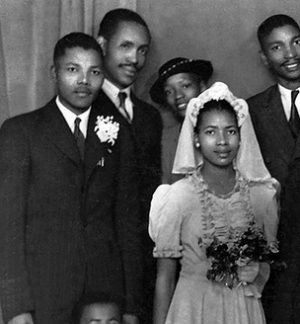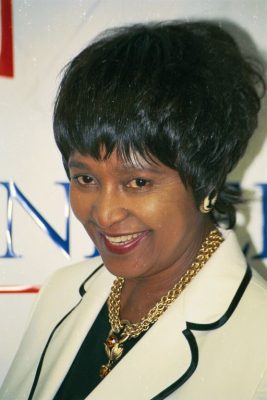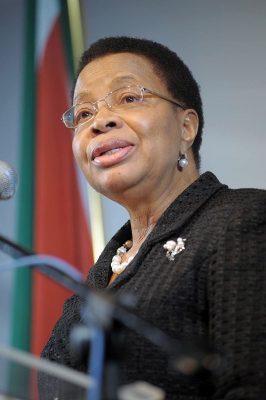Nelson Mandela (1918-2013) is one of the most celebrated men in history. He was a courageous leader who fought for the rights of all people, regardless of race or religion. While his political accomplishments are well-known, less is known about his personal life, specifically his three wives. In this article, we will take a closer look at Mandela’s wives and their contributions to his life and legacy. We will also explore how they coped with the ups and downs of being married to such an iconic figure.
Evelyn Mase
Mandela’s first wife was Evelyn Mase, a nurse whom he married in 1944. Evelyn was born on May 18, 1922, in Ngcobo, Transkei. Sadly, her father died when she was young and when Evelyn was 12 years old, her mother also passed away. As a result, Evelyn was orphaned and had to live under the care of her older brother, Sam.
Her brother was close with Walter Sisulu, who would go on to become Mandela’s political mentor. In fact, Walter was cousins with Sam and Evelyn (their mothers were sisters). When Sisulu moved to Orlando East in Johannesburg in 1928, Sam encouraged Evelyn to come to Johannesburg as well.
In 1939, she joined her brother and Sisulu there, then trained as a nurse in a non-European hospital at Hillbrow. It was at the hospital where she became friends with Water’s girlfriend, Albertina. When the couple got married in 1944, Evelyn was one of their bridesmaids. When Walter and Albertina moved to a bigger house, they gave their old house to Sam and Evelyn. The siblings continued to visit the newlyweds often, and it was during one of these visits that Evelyn met Nelson Mandela.
At the time, Mandela was studying law at the University of Witwatersrand and living with the Sisulus as a lodger. Mandela later recalled that Mase was “a quiet, pretty girl from the countryside.” The two started dating soon after, and within several months, Mandela proposed marriage. The couple tied the knot in a civil ceremony on October 5, 1944, at Johannesburg’s Native Commissioner’s Court.
“I think I loved him the first time I saw him,” Evelyn was quoted later on Higher Than Hope, a biography of Nelson Mandela that came out after he was released from prison in 1990. They had four children together: Madiba Thembekile (1945-1969), Makgatho Lewanika (1950-2005), Makaziwe (born 1947), and Pumla Makaziwe (born 1954).
During apartheid, the couple lived in Soweto, a black township outside of Johannesburg. While Mandela became increasingly politicized, Mase converted to the Jehovah’s Witnesses. She even publicly distributed their magazine, The Watchtower. She also made her two sons distribute copies to their neighbors. Evelyn urged Nelson to convert as well, but he refused. While he found some parts of The Watchtower’s system interesting, he thought that faith taught “passivity and submissiveness in the face of oppression.”
In the autobiography he wrote years later, he said that he often attended political meetings late at night, which led to Evelyn accusing him of infidelity. He implied that these accusations were untrue. However, later biographers found evidence that suggested Evelyn’s accusation of adultery was, in fact, correct. Furthermore, Nelson admitted to fellow activist Mac Maharaj that during the early 1950s, he led a “thoroughly immoral life.” But when Evelyn filed for divorce, she did so on account of physical abuse, not adultery. In August of 1956, Nelson filed a counter-report, denying Evelyn’s claims of assault.
The couple separated, and Evelyn moved in with her brother. Three months later, Evelyn withdrew her petition for divorce. The reason is unknown, but some historians like David Smith (author of Young Mandela) speculate that she might have wanted to reconcile with Nelson. As for the latter, he wanted to avoid a public divorce at all costs because it would damage his reputation in the African National Congress (ANC).
In 1957, Nelson met Winnie Madikizela. He started a relationship with her, even though he was still technically married to Evelyn. He eventually filed for divorce from Mase, which she did not contest. The couple’s divorce was finalized on March 18, 1958.
Winnie Madikizela
On June 14, 1958, three months after his divorce from Evelyn, Nelson married Winnie Madikizela. She was born to a Xhosa royal family in Mbhongweni, Bizana, and given the name Nomzamo Winifred Zanyiwe Madikizela. The name Nomzano means “she who tries .” Her parents, Columbus and Gertrude, were both teachers. Gertrude taught domestic science while Columbus taught history. Gertrude died when Winnie was nine years old. Winnie was the fifth of nine children, and all of them were sent to live with different relatives.
A few years later, she moved to Johannesburg to study at the Jan Hofmeyr School of Social Work. She earned a degree in social work in 1956. Winnie met Nelson while she was still working at the Baragwanath Hospital. He was still married to Evelyn Mase at the time. The story was that she was standing at a bus stop when Nelson approached her. They married in 1958 and had two daughters: Zenani (born 1959) and Zindziwa (1960-2020). Nelson was arrested and sentenced to life imprisonment when their children were 4 and 3 years old.
Nelson Mandela’s second wife was a controversial figure in her own right. She was an active member of the African National Congress (ANC) and was jailed several times for her political activities. After her husband’s release from prison, Winnie was elected to the ANC’s National Executive Council. However, she was later expelled from the organization due to allegations of corruption.
Winnie Mandela’s reputation was further tarnished by her involvement in the beating of four young men, known as the “soccer boys.” The soccer boys were accused of being informers for the police. They were tortured, and one of them, Stompie Moeketsi, was killed (also known as James Seipei). Nelson was eventually released in 1990, but he and Winnie decided to separate in 1992.
In a 1994 interview, the interviewer asked her if there was a chance for the couple to get back together. She replied, “I am not fighting to be the country’s First Lady. In fact, I am not the sort of person to carry beautiful flowers and be an ornament to everyone.” Nelson and Winnie finalized their divorce in March of 1996.
Graça Simbine Machel
Nelson Mandela’s third wife is Graça Machel. She was born on October 17, 1945, in Chefe Incadine, Portuguese Mozambique. She was the youngest of six children. Her father was a farmer and a minister. He died three weeks before Graça was born, but he instructed her older siblings to make sure she received an education. She was able to get through high school with help from her siblings; then, she got a church-based scholarship to study in Portugal. She majored in languages at Lisbon University in 1968, but she was forced to flee to Switzerland because she was under surveillance from the Portuguese secret police.
She joined the resistance group Frente de Libertação de Moçambique (FRELIMO) in 1973 when she returned to Portuguese east Africa and began working as a school teacher. FRELIMO, or in English the Mozambican Liberation Front, was a nationalist movement fighting for the independence of Mozambique from colonial rule. After Mozambique achieved independence in 1975, Graça became the first Minister of Education and Culture. She is well-known for her efforts in educating Mozambicans and for her work in organizations dedicated to the children of her country’s devastated areas.
That same year, she married Samora Machel, the president of Mozambique. The couple had two children together: Josina (born 1976) and Malengane (born 1978). She also became the stepmother of Samora’s five children from his first wife, Josina, as well as his previous companion, Sorita. In 1986, Samora Machel died in office when his presidential plane crashed near the Mozambican-South African border.
On July 18, 1998, twelve years after her first husband’s death, Graça married Nelson Mandela, who had already been serving as President of South Africa. Nelson and Graça first met in July 1990 when she was still in mourning for her late husband. They became friends, and their friendship eventually turned into a romantic relationship.
Graça Machel played a pivotal role in supporting her husband’s political work and accompanied him on many of his diplomatic missions. She also worked on various causes, including women’s and children’s rights. After Nelson Mandela’s death in 2013, Graça Machel became a leading figure in African politics and humanitarian work.


